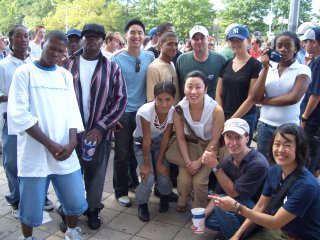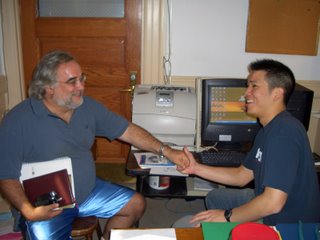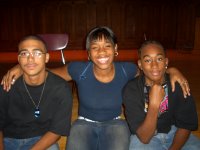Recap of 10/22 Mentoring Event
We had today, in my opinion, one of our more memorable and rewarding mentoring events since the inception of the mentoring program in September 2004.
Guest-Speaker to Initiate College Planning Process
The highlight of the event today came most certainly from our guest speaker, Mr. Daniel Nartey, a teacher at Morris Academy. Daniel is an accomplished and polished speaker, and a fluent story-teller. Added to those qualities is that he has an amazing personal story to tell (even more amazing that he’s under 25). He spoke to the group about coming from a single-mother household, his two older brothers both serving long-term prison sentences, being himself a teenage father, growing up in the South Bronx, beating the odds and going to an Ivy League university, feeling like a cultural outsider once he got there, making the most out of his college experience, and ultimately returning to his roots to serve as a teacher at Morris.
 From a functional standpoint, hearing his college planning process firsthand was hopefully a beneficial educational experience for the students. Daniel is an ideal role-model for these kids, having come up from similar beginnings and maintaining day-to-day contact with them. He told them that there were scholarship opportunities out there for them. He encouraged them to start thinking early about SATs, and taking it multiple times (he himself took it three times, and improved his score each time). He also recounted to them his college experience attending and graduating from Brown University. While an accomplishment in and of itself, it was not without its difficulties.
From a functional standpoint, hearing his college planning process firsthand was hopefully a beneficial educational experience for the students. Daniel is an ideal role-model for these kids, having come up from similar beginnings and maintaining day-to-day contact with them. He told them that there were scholarship opportunities out there for them. He encouraged them to start thinking early about SATs, and taking it multiple times (he himself took it three times, and improved his score each time). He also recounted to them his college experience attending and graduating from Brown University. While an accomplishment in and of itself, it was not without its difficulties.

He pressed upon the students to expect a culture gap that exists for students matriculating into an institution like Brown. Daniel talked about the hardships endured in adjusting to an academic and cultural environment far different than that of his upbringing in the South Bronx. However, he urged them to fight through it, saying that (1) getting the acceptance letter from Brown was “one of the two happiest moments of my life, the other being witnessing the birth of my son” and (2) despite the numerous hardships of feeling like an outsider at Brown, he would never trade away his experience there.
From an academic standpoint, Daniel relayed that the most frustrating part experience at Brown was not knowing that what he was doing wrong was in fact wrong. I could relate to that point completely: It’s one thing when you understand the mistake you are making, and aim to fix it in future occurrences. It’s another when you can’t recognize where you’re at fault. He explained to the students that they were likely to go through similar experiences in the future, but encouraged them to continue working through it.
He told us that all of this changed once he rededicated himself to excel academically, and when he started to realize his ambition for teaching. The coursework then became more focused and relevant, and he could start to see the forest from the tree (my words, not his).
During his speech, he stressed the importance of writing, and put it in even starker terms for the students. As a result of one essay for a Taft High School scholarship, Daniel received $9k to cover tuition expenses over his four years at Brown. In other words, One Essay = $36k. He also submitted pieces of poetry to the NAACP as part of a separate scholarship program, and received additional financial support. All in, he was able to reduce what would have normally amounted to $35k of annual tuition plus living expenses at Brown to a few thousand dollars annually as a result of these scholarships.
Out of the Q&A, one characterization that was striking to me came as a result of a question I posed to him. I had asked him how his relationships with friends from high school changed as it became clear that he was headed to college. It was an issue for Curtis Jennings in “A Hope for the Unseen”, a non-fiction account of a student in a very similar circumstance written by former Wall Street Journal report Ron Suskind. Daniel’s response was somewhat surprising, considering the struggles he underwent to reach his academic achievements. He told us that his high school accomplishments were not extraordinary in the sense that it could have easily been one of his friends that made it to college and not him. He told us that not every one of his friends had an opportunity to attend SAT prep offered as part of a special program at Clinton High School. My take is that it was a mix of humility, given that he did graduate as salutorian (second-ranked student in graduating class) at Taft, and realism about his situation. For those qualities, I admire him even more.
The takeaway for the students: Don’t let your struggles define you. Instead, what matters more is how you approach those predicaments, and how you come out as a person.
Goal-Setting Exercise
The second half of the program was set on the practical exercise of goal-setting. We had originally done a session with the students during the 2004-2005 academic year, in which the students were asked to enumerate their goals in the context of short-term personal and academic, and long-term personal and academic goals. These goals were characterized based on the following:
SMART Goals
S=Specific
M=Measurable
A=Attainable
R=Realistic
T=Time-Sensitive

Recap of Breakout Session 
Columbus, Jon, Brian, Glenn and I spent time together in a back conference room with the purpose of doing a goal-setting exercise. However, the natural progression of our conversation started with a question regarding Columbus’ and Jon’s college ambitions. We learned that both of them were intent on going, and as sophomores, they are gearing the remainder of their high school years with that goal in mind. We talked about the SATs, and their readiness to begin studying for the exams. We also talked about the job-search process, in particular, hearing their frustrations in trying to find part-time jobs. We encouraged them to be more proactive in call-backs and initiating meetings with hiring decision-makers. Lastly, we tried to get from them some perspective on what we’re hoping to do with the Morris Academy Internship Program, which I’ll discuss in a separate posting once we fill out the details.
Columbus then asked us whether we believed the military would be a viable option for them. My response was that I had seen friends of mine go through basic training and enlisted service, and they generally came out with a higher level of discipline, responsibility, respect for systems, and work ethic. Glenn had the most to say about it because he has a sister who is an Air Force reservist on the medical side. Columbus mentioned that he had in fact met with recruiting officers to get first-hand accounts for military life. We encouraged him to continue to do so, but to also keep non-military options open as well.
Next, we asked both Columbus and Jon to give honest answers about what they were looking to get out of the mentor program. They offered these reasons (in no particular order): (1) spending time with friends, (2) understanding an adult perspective for jobs, broader responsibilities, etc., and (3) support from mentors. We then returned the favor by giving our reasons for wanting to become mentors – gravitating outside our usual social bubble, giving back in a way that acknowledges how fortunate we are to be where we are, believing that the mentor/mentee relationship is a reciprocal learning experience, and wanting to contribute to our communities in a meaningful way.

Unfortunately, with all of this discussion, we only got to peel away the first layer of the goal-setting exercise before the 11:45am mark hit and the scent of pizza finally made its way to the back of the office. Despite not achieving the nominal goal of setting goals (I know, the irony is striking), I think Glenn, Brian and I all learned something and gained a larger perspective for the mentor program in general.
For those interested in getting a visual look at the event, please find the online photo album at the follow flickr link:
http://www.flickr.com/photos/75191100@N00/sets/1191062/
Tour of Columbia University 
The final leg of the day was a physical tour of the Columbia University campus uptown. Due to some brilliant planning coordinated by our programming team and the team of Sheba Sethi/Ejike Uzoigme, the group was able to turn the discussion of college planning into concrete ways by showing the students life on an elite college campus. Ejike showed the poise of a true admissions officer as he took a group of 25 or so students and mentors around campus. He imparted knowledge of the university unseen from even current students there (slight exaggeration, but not too far away from the truth). It was factoid after factoid of hidden truths. It was also impressive the level of access we got from the campus considering that we were not a sanctioned tour. We were granted entry into all of the floors of the student center, the auditorium, and the library. Due to the rowdiness of the group, I had at times difficulty telling who was better behaved, the high-schoolers or the mentors. Nonetheless, it was quite an educational experience for the students, and an entertaining time for the mentors.
 The highlight of the tour of Columbia came when a family from Cleveland, OH, who was making a college visit along with their son, a high school junior, joined us on the tour. At first, we didn’t have the heart to tell them that the impromptu tour was not an officially sanctioned one from the admissions department. However, it soon became clear that they, along with all of the students from Morris, were in very-good hands with our resident mentor/Columbia alumnus (for those viewing the photos of the event, Ejike is the black guy wearing the red/black North Face jacket). Once we explained what we were doing, and after they lamented the fact that there were no scheduled tours during the day, we asked them to continue to tag-along. A few of the mentors, myself included, even initiated conversation with the son to impart whatever knowledge we could about the college process. I think they were appreciative of it, and hope that we gave them a favorable view of our city.
The highlight of the tour of Columbia came when a family from Cleveland, OH, who was making a college visit along with their son, a high school junior, joined us on the tour. At first, we didn’t have the heart to tell them that the impromptu tour was not an officially sanctioned one from the admissions department. However, it soon became clear that they, along with all of the students from Morris, were in very-good hands with our resident mentor/Columbia alumnus (for those viewing the photos of the event, Ejike is the black guy wearing the red/black North Face jacket). Once we explained what we were doing, and after they lamented the fact that there were no scheduled tours during the day, we asked them to continue to tag-along. A few of the mentors, myself included, even initiated conversation with the son to impart whatever knowledge we could about the college process. I think they were appreciative of it, and hope that we gave them a favorable view of our city.
 Here is the flickr link for the Columbia tour:
Here is the flickr link for the Columbia tour:
http://www.flickr.com/photos/75191100@N00/sets/1191149/







